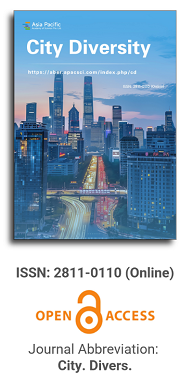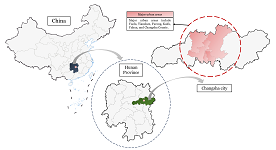
Asia Pacific Academy of Science Pte. Ltd. (APACSCI) specializes in international journal publishing. APACSCI adopts the open access publishing model and provides an important communication bridge for academic groups whose interest fields include engineering, technology, medicine, computer, mathematics, agriculture and forestry, and environment.

As China's pillar industry, the property market has suffered a considerable impact in recent years, with a decline in turnover and many developers at risk of bankruptcy. As one of the most concerned factors for stakeholders, housing prices need to be predicted more objectively and accurately to minimize decision-making errors by developers and consumers. Many prediction models in recent years have been unfriendly to consumers due to technical difficulties, high data demand, and varying factors affecting house prices in different regions. A uniform model across the country cannot capture local differences accurately, so this study compares and analyses the fitting effects of multiple machine learning models using February 2024 new building data in Changsha as an example, aiming to provide consumers with a simple and practical reference for prediction methods. The modeling exploration applies several regression techniques based on machine learning algorithms, such as Stepwise regression, Robust regression, Lasso regression, Ridge regression, Ordinary Least Squares (OLS) regression, Extreme Gradient Boosted regression (XGBoost), and Random Forest (RF) regression. These algorithms are used to construct forecasting models, and the best-performing model is selected by conducting a comparative analysis of the forecasting errors obtained between these models. The research found that machine learning is a practical approach to property price prediction, with least squares regression and Lasso regression providing relatively more convincing results.
Integrating Fengshui and environmental psychology into contemporary architecture design for enhanced occupant well-being
Vol 6, Issue 1, 2025
Download PDF
Abstract
This review provides a comprehensive analysis and develops an integrated framework for incorporating Fengshui principles into modern architectural design, focusing on their multidimensional impact on occupant well-being. In ancient China, Fengshui is a sophisticated practice integrating spatial layout and environmental optimization, drawing from natural sciences such as geography, geology, meteorology, and environmental studies. Its core objective is to harmonize the natural and built environments, creating optimal living conditions that support a harmonious coexistence between humans and nature. By regulating the flow of spatial energy, Fengshui fosters livable and balanced spaces, enhancing thermal comfort, aesthetic appeal, cultural and spiritual significance, and environmental sustainability. These benefits underscore Fengshui’s contemporary relevance in modern architectural practices, showcasing its unique potential to create spaces that promote holistic well-being. This study systematically identifies four key advantages of Fengshui and explores its reintegration into modern design, emphasizing its historical wisdom in respecting and harmonizing with nature. Despite facing obstacles related to scientific validation and cultural adaptability, Fengshui is proposed as a significant theoretical framework and practical resource for architects and urban planners. It can be utilized to design environments that promote human well-being, enrich cultural significance, and support sustainability.
Keywords
References
- Magli G. Astronomy and Feng Shui in the projects of the Tang, Ming and Qing royal mausoleums: A satellite imagery approach. Archaeological Research in Asia. 2019; 17: 98–108. doi: 10.1016/j.ara.2018.10.004
- Guo Y. Fengshui: Science, Religion, Superstition, or Trade? Zygon®. 2023; 58(3): 591–613. doi: 10.1111/zygo.12887
- Zheng Y. Analysis on the application and technology of the five elements in Chinese ancient buildings. Forest Chemicals Review. 2022; 1260–1268.
- Bruun O. In: An Introduction to Feng Shui. Cambridge University Press; 2008.
- He D, Yuan L, Chen W. The connections between Historic Urban Landscape layers in Jingdezhen, the porcelain capital of China. Landscape Research. 2024; 49(3): 393–409. doi: 10.1080/01426397.2023.2296508
- Huang KH, Fang WT. Developing Concentric Logical Concepts of Environmental Impact Assessment Systems: “Feng Shui” Concerns and Beyond. Journal of Architectural and Planning Research. 2013; 39–55.
- Paton MJ. Science and Fengshui: The concept shi 勢, rationality and emotion, and the ritualisation of knowledge. Science & Education. 2021; 30(6): 1371–1386. doi: 10.1007/s11191-021-00255-6
- Paton MJ. Cities created by modernity: A fengshui perspective. Journal of Chinese Philosophy. 2015; 42(5): 477–499. doi: 10.1163/15406253-04205004
- Han KT. Effects of visible greenness, quantity and distance of indoor plants on human perceptions and physical parameters. Indoor and Built Environment. 2021; 30(9): 1353–1372. doi: 10.1177/1420326x20939595
- Guo P, Ding C, Guo Z, et al. Coupling CFD simulation and field experiments in summer to prove Feng Shui optimizes courtyard wind environments: A case study of Prince Kung’s mansion in Beijing. Buildings. 2022; 12(5): 629. doi: 10.3390/buildings12050629
- Zhao Z, Zhang S, Peng Y. Analysis of Winter Environment Based on CFD Simulation: A Case Study of Long-Hu Sand Feng Shui Layout at Jiangxi Bailudong Academy Complex. Buildings. 2023; 13(4): 1101. doi: 10.3390/buildings13041101
- Guan R, Chen Y, Chen X. Scientific Evaluation of Fengshui from the Perspective of Geography: Empirical Evidence from the Site Selection of Traditional Hakka Villages. Applied Spatial Analysis and Policy. 2024; 17(4): 1545–1568. doi: 10.1007/s12061-024-09595-6
- Soflaei F, Shokouhian M, Zhu W. Socio-environmental sustainability in traditional courtyard houses of Iran and China. Renewable and Sustainable Energy Reviews. 2017; 69: 1147–1169. doi: 10.1016/j.rser.2016.09.130
- Chiu YH, Wang KF, Lin SW. Thermal comfort, visibility, and the spatial layout in classical gardens of Suzhou, China. Applied Ecology & Environmental Research. 2023; 21(3): 1991–2009.
- Bonaiuto M, Bilotta E, Stolfa A. “Feng Shui” and environmental psychology: A critical comparison. Journal of Architectural and Planning Research. 2010; 27(1): 23–34.
- Teather EK, Chow CS. The Geographer and the Fengshui Practitioner: So close and yet so far apart? Australian Geographer. 2000; 31(3): 309–332. doi: 10.1080/713612250
- Zhao X. The Hall of Superabundant Blessings: Toward an Architecture of Chinese Ancestral-Temple Theatre. Asian Theatre Journal. 2017; 34(2): 397–415. doi: 10.1353/atj.2017.0029
- Liang Q. Huangdizhaijing; Huangdi’s Mansion Scripture. In: Daozang. Wenwu Publishing Company; 1988.
- Li X. The aesthetic of the absent The Chinese conception of space. The Journal of Architecture. 2002; 7(1): 87–101. doi: 10.1080/13602360110114740
- Knapp RG. Rural housing and village transformation in Taiwan and Fujian. The China Quarterly. 1996; 147: 779–794. doi: 10.1017/s0305741000051791
- Madeddu M, Zhang X. Harmonious spaces: the influence of Feng Shui on urban form and design. Journal of Urban Design. 2017; 22(6): 709–725. doi: 10.1080/13574809.2017.1336061
- Shokri A, Shieh E, Vahid A. Urban feng shui based on citizenship rights and its impact on the spatial structure and mental health of citizens: Review. Annals of Medicine & Surgery. 2023. doi: 10.1097/ms9.0000000000001507
- Hong SK, Song IJ, Wu J. Fengshui theory in urban landscape planning. Urban Ecosystems. 2007; 10(3): 221–237. doi: 10.1007/s11252-006-3263-2
- Wang C, Hong WT, Abdul-Rahman H. Architectural examination on feng shui bedroom. Open House International. 2018; 43(2): 40–48. doi: 10.1108/ohi-02-2018-b0007
- Xiong Y, Zhang J, Yan Y, et al. Effect of the spatial form of Jiangnan traditional villages on microclimate and human comfort. Sustainable Cities and Society. 2022; 87: 104136. doi: 10.1016/j.scs.2022.104136
- Zheng W, Li B, Cai J, et al. Microclimate characteristics in the famous dwellings: A case study of the Hakka Tulou in Hezhou, China. Urban Climate. 2021; 37: 100824. doi: 10.1016/j.uclim.2021.100824
- Tang L, Zhang N. A study on the thermal environment of historical villages with “comb-like” layout in southern China. Indoor and Built Environment. 2018; 27(5): 658–664. doi: 10.1177/1420326x16682821
- So ATP, Lu JWZ. Natural ventilation design by computational fluid dynamics—a feng-shui approach. Architectural Science Review. 2001; 44(1): 61–69. doi: 10.1080/00038628.2001.9697454
- Zhang M, Du J, Yang M. Biophilia and visual preference for Chinese vernacular windows: an investigation into shape. Journal of Asian Architecture and Building Engineering. 2023; 22(5): 2448–2459. doi: 10.1080/13467581.2022.2160203
- Zhang M, Liu F, Liu Q, et al. Climate Adaptation Analysis and Comfort Optimization Strategies for Traditional Residential Buildings in Hot-Summer, Cold-Winter Regions: A Case Study in Xuzhou, China. Sustainability. 2024; 16(8): 3411. doi: 10.3390/su16083411
- Parkes G. Winds, waters, and earth energies: Fengshui and sense of place. In: Nature across cultures: Views of nature and the environment in non-Western cultures. Springer Netherlands; 2003. pp. 185–209.
- Tang L, Nikolopoulou M, Zhang N. Bioclimatic design of historic villages in central-western regions of China. Energy and Buildings. 2014; 70: 271–278. doi: 10.1016/j.enbuild.2013.11.067
- Kobi M. Warm bodies in the Chinese borderlands: architecture, thermal infrastructure, and territorialization in the arid continental climate of Ürümchi, Xinjiang. Eurasian Geography and Economics. 2020; 61(1): 77–99. doi: 10.1080/15387216.2020.1714461
- Baratta NC, Magli G. The role of astronomy and Feng Shui in the planning of Ming Beijing. Nexus Network Journal. 2021; 23(3): 767–787. doi: 10.1007/s00004-021-00555-y
- Wu WC, Ma YC, Bourassa SC. Folk Customs and Home Improvement Decisions. International Real Estate Review. 2018; 21(3): 317–341.
- Wu W, Yau OHM, Lu H. Feng shui principles in residential housing selection. Psychology & Marketing. 2012; 29(7): 502–518. doi: 10.1002/mar.20538
- Çeliker A, Çavuşoğlu BT, Öngül Z. Comparative study of courtyard housing using feng shui. Open House International. 2014; 39(1): 36–47. doi: 10.1108/ohi-01-2014-b0005
- Schweitzer M, Gilpin L, Frampton S. Healing spaces: elements of environmental design that make an impact on health. Journal of Alternative and Complementary Medicine. 2004; 10(1): 71–83. doi: 10.1089/1075553042245953
- Chen Q, Feng Y, Wang G. Healthy buildings have existed in China since ancient times. Indoor and Built Environment. 1997; 6(3): 179–187. doi: 10.1177/1420326x9700600309
- Ho S, Chuang ST. The influence of lay theories of Feng Shui on consumers’ peace of mind: The role of regulatory fit. Asian Journal of Social Psychology. 2012; 15(4): 304–313. doi: 10.1111/j.1467-839x.2012.01385.x
- Zhang S. The heritage practices in a Chinese historic neighbourhood: the manifestation of traditional Feng Shui in Langzhong, China. International Journal of Heritage Studies. 2018; 24(5): 531–546. doi: 10.1080/13527258.2017.1390778
- Coggins C. Sacred Watersheds and the fate of the village body politic in Tibetan and han communities under China’s ecological civilization. Religions. 2019; 10(11): 600. doi: 10.3390/rel10110600
- Coggins C, Chevrier J, Dwyer M, et al. Village fengshui forests of southern China—culture history and conservation status. ASIANetwork Exchange: A Journal for Asian Studies in the Liberal Arts. 2012; 19(2): 52. doi: 10.16995/ane.43
- Yuan J, Liu J. Fengshui forest management by the Buyi ethnic minority in China. Forest Ecology and Management. 2009; 257(10): 2002–2009. doi: 10.1016/j.foreco.2009.01.040
- Chen J, Lin W, Zhang Y, et al. Village fengshui forests as forms of cultural and ecological heritage: interpretations and conservation policy implications from southern China. Forests. 2020; 11(12): 1286. doi: 10.3390/f11121286
- Ma KV, Nguyen PV, Ahmed ZU. The role of government policy, social infrastructure and Fengshui in intending to buy tourism real estate. PLOS ONE. 2023; 18(7): e0281436. doi: 10.1371/journal.pone.0281436
- Ren X. Socially engaged architecture in a Chinese rural village: Xihe Village Community Centre, 2014. Architectural Research Quarterly. 2016; 20(2): 119–130. doi: 10.1017/s1359135516000282
- Lin X, Wu Y. Architectural spatial characteristics of Fujian Tubao from the perspective of Chinese traditional ethical culture. Buildings. 2023; 13(9): 2360. doi: 10.3390/buildings13092360
- Chen B, Coggins C, Minor J, Zhang Y. Fengshui forests and village landscapes in China: Geographic extent, socioecological significance, and conservation prospects. Urban Forestry & Urban Greening. 2018; 31: 79–92.
- Liu P, Zeng C, Liu R. Environmental adaptation of traditional Chinese settlement patterns and its landscape gene mapping. Habitat International. 2023; 135: 102808. doi: 10.1016/j.habitatint.2023.102808
- Ge YJ, Liu YJ, Shen AH, Lin XC. Fengshui forests conserve genetic diversity: a case study of Phoebe bournei (Hemsl.) Yang in southern China. Genetics and Molecular Research. 2015; 14(1): 1986–1993. doi: 10.4238/2015.march.20.8
- Zhou L, Huang L, Jin C, et al. Fengshui forests as a conservation paradigm of the golden larch in China. Forest Ecology and Management. 2022; 520: 120358. doi: 10.1016/j.foreco.2022.120358
- Marafa L. Integrating natural and cultural heritage: the advantage offeng shuilandscape resources. International Journal of Heritage Studies. 2003; 9(4): 307–323. doi: 10.1080/1352725022000155054
- Wang Z, Liu T, Wu X, et al. Influence of Doorway Position on Wind Comfort in Beijing Quadrangle Dwellings. Buildings. 2023; 13(10): 2557. doi: 10.3390/buildings13102557
- Hu L, Li Z, Liao W, Fan Q. Values of village fengshui forest patches in biodiversity conservation in the Pearl River Delta, China. Biological Conservation. 2011; 144(5): 1553–1559. doi: 10.1016/j.biocon.2011.01.023
- Qi L, Liu R, Cui Y, et al. Study of the Landscape Pattern of Shuiyu Village in Beijing, China: A Comprehensive Analysis of Adaptation to Local Microclimate. Sustainability. 2021; 14(1): 375. doi: 10.3390/su14010375
- Neisser U. In: Cognitive psychology. Taylor & Francis; 1967.
- Mak MY, Ng ST. Feng shui: an alternative framework for complexity in design. Architectural Engineering and Design Management. 2008; 4(1): 58–72. doi: 10.3763/aedm.2008.s307
- Kaplan R, Kaplan S, Brown T. Environmental preference: A comparison of four domains of predictors. Environment and Behavior. 1989; 21(5): 509–530. doi: 10.1177/0013916589215001
- Ulrich RS. View through a window may influence recovery from surgery. Science. 1984; 224(4647): 420–421. doi: 10.1126/science.6143402
- Benko L. In: The Holistic Home: Feng Shui for Mind, Body, Spirit, Space. Simon and Schuster; 2024.
- Beute F, de Kort YAW. Natural resistance: Exposure to nature and self-regulation, mood, and physiology after ego-depletion. Journal of Environmental Psychology. 2014; 40: 167–178. doi: 10.1016/j.jenvp.2014.06.004
- Hong WT, Abdul-Rahman H, Wang C. The application of Form School Feng Shui model in a sleep environment: human preferences and subjective sleep quality evaluation. Architectural Engineering and Design Management. 2016; 12(6): 442–459. doi: 10.1080/17452007.2016.1208076
- Ulrich RS, Simons RF, Losito BD, et al. Stress recovery during exposure to natural and urban environments. Journal of Environmental Psychology. 1991; 11(3): 201–230.
- Bar M, Neta M. Humans prefer curved visual objects. Psychological Science. 2006; 17(8): 645–648. doi: 10.1111/j.1467-9280.2006.01759.x
- Küller R, Mikellides B, Janssens J. Color, arousal, and performance—A comparison of three experiments. Color Research & Application. 2009; 34(2): 141–152. doi: 10.1002/col.20476
- Ren Y, Woudstra J. Between fengshui and neighbors: case studies of participant-led house-making in rural east China. Architecture and Culture. 2022; 10(3): 512–533. doi: 10.1080/20507828.2022.2110779
- Gehl J. In: Cities for people. Island Press; 2010.
- Han KT. An empirical study of consistency in the judgments of Feng Shui scholars and practitioners regarding taboos for residential space. Heliyon. 2023; 9(4): e15296. doi: 10.1016/j.heliyon.2023.e15296
- McMahon D. Geomancy and Walled Fortifications in Late Eighteenth Century China. Journal of Military History. 2012; 76(2): 373–393.
- Huang L, Tian L, Zhou L, et al. Local cultural beliefs and practices promote conservation of large old trees in an ethnic minority region in southwestern China. Urban Forestry & Urban Greening. 2020; 49: 126584. doi: 10.1016/j.ufug.2020.126584
- Han KT, Lin JK. Empirical and quantitative studies of Feng Shui: A systematic review. Heliyon. 2023; 9(9): e19532. doi: 10.1016/j.heliyon.2023.e19532
- Wu Z, Kong F, Wang Y, et al. The impact of greenspace on thermal comfort in a residential quarter of Beijing, China. International Journal of Environmental Research and Public Health. 2016; 13(12): 1217. doi: 10.3390/ijerph13121217
- Zhong J, Jia S, Liu R. Improvement of Indoor Thermal Environment in Renovated Huizhou Architecture. International Journal of Heat and Technology. 2019; 37(2): 633–640. doi: 10.18280/ijht.370235
- Li SY. Community-based forestry and the functions of institutions: a case study of Fung Shui forests in Hong Kong. International Forestry Review. 2018; 20(3): 362–374. doi: 10.1505/146554818824063078
- Choe SJ, Han SH. Applicability of Feng Shui thoughts for sustainable space planning and evaluation in Korea verified using three-dimensional digital mapping and simulations. Sustainability. 2019; 11(20): 5578. doi: 10.3390/su11205578
- Jin Z, Juan YK. Is Fengshui a science or superstition? A new approach combining the physiological and psychological measurement of indoor environments. Building and Environment. 2021; 201: 107992. doi: 10.1016/j.buildenv.2021.107992
- Fernandez-Beanato D. Feng shui and the demarcation project. Science & Education. 2021; 30(6): 1333–1351. doi: 10.1007/s11191-021-00240-z
- Charles R, Glover S, Bauchmüller K, Wood D. Feng shui and emotional response in the critical care environment (FARCE) study. Anaesthesia. 2017; 72(12): 1528–1531. doi: 10.1111/anae.14105
- Hwangbo AB. An alternative tradition in architecture: conceptions in feng shui and its continuous tradition. Journal of Architectural and Planning Research. 2002; 110–130.
Supporting Agencies
Copyright (c) 2025 Author(s)
License URL: https://creativecommons.org/licenses/by/4.0/

This site is licensed under a Creative Commons Attribution 4.0 International License (CC BY 4.0).

Prof. Mehmet Cetin
Kastamonu University,
Turkey
Polish Scientific Bibliography

